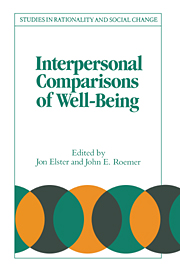Book contents
- Frontmatter
- Contents
- List of contributors
- Acknowledgments
- Introduction
- 1 The moral basis of interpersonal comparisons
- 2 Against the taste model
- 3 Utilitarian metaphysics?
- 4 Local justice and interpersonal comparisons
- 5 Notes on the psychology of utility
- 6 Adult-equivalence scales, interpersonal comparisons of well-being, and applied welfare economics
- 7 Interpersonal comparisons of utility: Why and how they are and should be made
- 8 A reconsideration of the Harsanyi–Sen debate on utilitarianism
- 9 Deducing interpersonal comparisons from local expertise Ignacio
- 10 Subjective interpersonal comparison
- 11 Utilitarian fundamentalism and limited information
- Index
9 - Deducing interpersonal comparisons from local expertise Ignacio
Published online by Cambridge University Press: 05 June 2012
- Frontmatter
- Contents
- List of contributors
- Acknowledgments
- Introduction
- 1 The moral basis of interpersonal comparisons
- 2 Against the taste model
- 3 Utilitarian metaphysics?
- 4 Local justice and interpersonal comparisons
- 5 Notes on the psychology of utility
- 6 Adult-equivalence scales, interpersonal comparisons of well-being, and applied welfare economics
- 7 Interpersonal comparisons of utility: Why and how they are and should be made
- 8 A reconsideration of the Harsanyi–Sen debate on utilitarianism
- 9 Deducing interpersonal comparisons from local expertise Ignacio
- 10 Subjective interpersonal comparison
- 11 Utilitarian fundamentalism and limited information
- Index
Summary
Introduction
Economists accept the idea that a person can have a coherent ordering over the states of the world; yet it is commonplace to balk at the notion that there exists a coherent interpersonal ordering, which would give sense to statements of the form 'person i is better off in state x than person j is in state y.′ The reason for such skepticism is that whereas in the first case one mind is making judgments about states of the world, there is no universal mind that can make interpersonal judgments. Nevertheless, most of us feel capable of making some interpersonal comparisons, perhaps by virtue of the limited empathy we feel, because we believe at some level all people are relevantly similar. We will argue that it may be quite reasonable to suppose the existence of an interpersonal ordering of the states of the world, based on a kind of empathy that a person can legitimately feel, because he has, during his life, indeed been a person of various different types.
Interpersonally comparable utility has had a checkered history. In the nineteenth century (see Cooter and Rappoport (1986)), the possibility of interpersonal comparisons was taken for granted by many social theorists. The ordinalist revolution dissolved this innocent presumption; its supporters claimed that interpersonal comparisons were necessarily normative, hence not within the purview of positive economics (see also Sen (1979) for a discussion). There are, it seems, two different bases for the current agnosticism, or rather nihilism, with respect to the existence of an interpersonal ordering.
- Type
- Chapter
- Information
- Interpersonal Comparisons of Well-Being , pp. 321 - 336Publisher: Cambridge University PressPrint publication year: 1991
- 2
- Cited by



